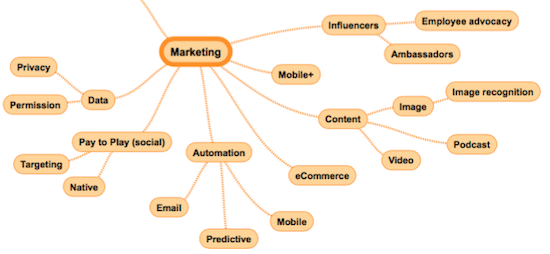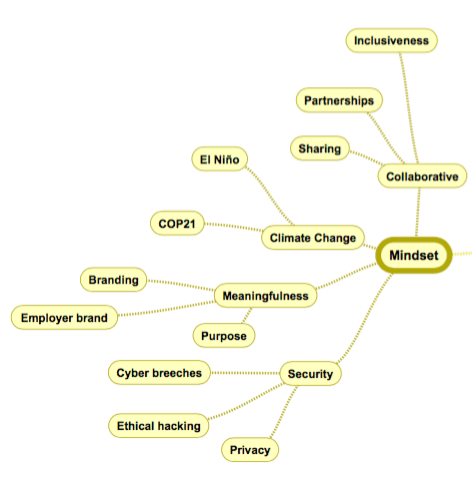Last week, I published the first section of the business trends predictions for 2016, focusing on the new technology trends. This week, I present the other two sections, looking at the trends for marketing and in terms of mindset. The truth is that, if organizations are to take advantage of these trends, it must come with the right mindset. Below I set out the four big mindset shifts as I see them.
Marketing trends 2016

- Mobile+ – It’s mobile plus, because most serious brands have more or less adopted mobile friendly sites (e.g. responsive). However, the “easy” answer is hardly the best one. This year, we will see ever greater improvement and sophistication in mobile user experience. Even if there will still be big name stragglers, the mobile as the central nervous system of the customer (and employee) will become a central preoccupation for marketing and retail teams.
- Content Marketing – With the glut in content, excellence and creativity in content creation -- adapted to the different contexts -- will be crucial for breakthrough marketing. Share on X It will also be about well articulated distribution strategies.
- Ecommerce – Ecommerce is no longer an option, even for the luxury brands. Not only will ecommerce become more important for the traditional players, but pure players will increasingly look to add offline to their mix as the omnicanality takes hold. Amazon remains the benchmark, even for luxury.
- Marketing Automation – Perhaps a necessary evil for the larger brands, marketing automation is taking an ever big role in managing the customer relationship Share on X There will inevitably be many case studies of marketing automation failure as marketers will be tempted to take the easy (aka lazy) route.
- Pay to Play Social – Social media is no longer a free ride. In order to grow or leverage one’s fanbase, it will all be about the smarter investments and refining how social contributes to the sales funnel.
- Data Analytics – Not only are there ever more sources of data, but there is a growing awareness at the board level of the opportunities to use the data to enhance business processes and the customer relationship. Privacy issues will be a dominant concern and permission-based marketing will be for the brands willing to play for the long haul.
- Influencer marketing – Moving from just identifying online influencers, brands are going to learn to refine their approach to engage with influencers. An important part of the influencer ‘movement’ will be through enhancing employee advocacy. One of the reasons why influencer marketing is such an obvious need is that social is now essentially a paying channel. Relevant influencers own credible reach. Share on X
Mindset trends
The shifts in mindset often come bundled with the technology. However, they are also independent of technology. Brands that learn how to adopt the right mindset will find the best ways to leverage the tech innovations. Share on X
 Collaboration – Working in collaboration (which can also mean co-opetition) will be key to managing the changing landscape. It’s also a cornerstone mindset for the sharing economy.
Collaboration – Working in collaboration (which can also mean co-opetition) will be key to managing the changing landscape. It’s also a cornerstone mindset for the sharing economy.- Climate Change – Surfing on the back of the COP21 conference and faced with more natural phenomena (e.g. El Nino), brands will have to become more resolute about their sustainable development programs. It’s not about just reducing energy costs, but embedding the climate change mindset into all aspects of the organization.
- Meaningfulness – With everyone’s time at a premium, people are looking to place value on the way they spend it, especially when it comes to the place of employment. The brand's purpose has weight in attracting talent, but also in eliciting the highest amount of discretionary energy. Share on X Consumers, meanwhile, are paying more attention to the ethics and purpose of the products and services they are buying. In greater mindfulness, there is also a sense of meaningfulness.
- Security – In a climate of insecurity, one might think this is just about the threat of terrorism. From a business standpoint, employee and consumer frailty is a possible risk. The bigger issue from a business standpoint is cyber security, the need to develop ethical hacking programs and the appropriate definition of and boundary around privacy.
Your thoughts and reactions are as ever welcome and appreciated.


 Collaboration – Working in collaboration (which can also mean co-opetition) will be key to managing the changing landscape. It’s also a cornerstone mindset for the sharing economy.
Collaboration – Working in collaboration (which can also mean co-opetition) will be key to managing the changing landscape. It’s also a cornerstone mindset for the sharing economy.








